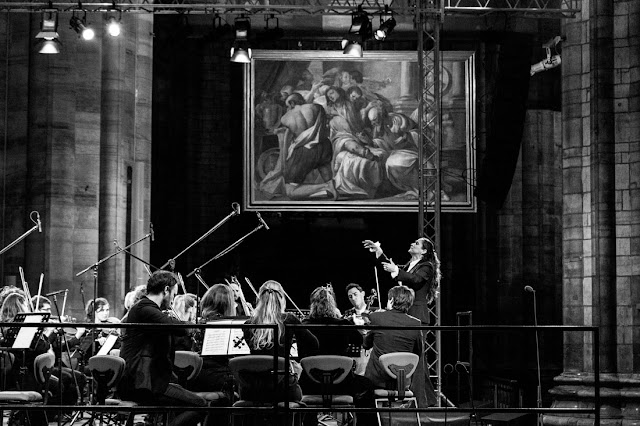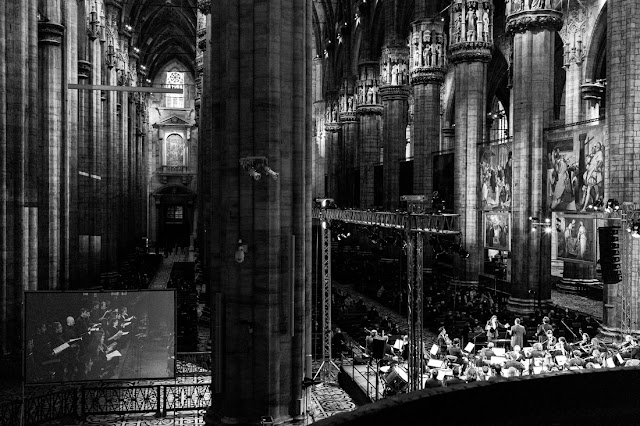 |
| Metanoia - Ensemble K & Simone Menezes at Milan Cathedral (Photo Maxime Patrick Hans Chatillon) |
In Christian theology, metanoia is commonly understood as "a transformative change of heart, especially a spiritual conversion". But what does it mean in a musical context? The conductor Simone Menezes has recently produced a film, Metanoia, with her Ensemble K and Emmy-winning film director Paul Smaczny, described as a celebration of the power of beauty which invites the viewer to contemplate the question of transcendence.
When I ask what the film is about, Simone laughs and says that the subject was so complicated that she had to make a film about it to answer the question. The project simply began as a concert at Milan Cathedral where she wanted to bring an element of introspection and contemplation to the programme. The music was to include Puccini's Messa di Gloria, the Sarabande from Bach's Violin Partita No. 1 in B minor and Villa Lobos' Prelude from Bachianas Brasileiros No. 4, also in B minor. But things happened, COVID happened, the dates changed. Also, she became interested in the question of what do some composers have, that they can make magic. What happens in music that makes it go beyond intellect and makes something transcendent.
It was this issue of thinking about transcendence which led to the film, which is set in Italy where the Renaissance was created. She wanted to open the discussion to include other arts and philosophy, to ask the question what is transcendence in both art and music. In order to give the concert in Milan Cathedral, the authorities had wanted them to perform just sacred music, which led to the question what was sacred music? But it helped that metanoia, which Simone translates as beyond intellect, a way of seeing the world beyond the intellect, also has the theological meaning described above.
 |
| Metanoia - Ensemble K & Simone Menezes at Milan Cathedral (Photo Maxime Patrick Hans Chatillon) |
For the film, they included the music from the concert, Puccini, Bach and Villa Lobos, and alongside put Arvo Pärt's In Spe. Simone also wanted to include an element of dance and so included Borodin's Polovtsian Dances which Ensemble K performed on their Accents disc [see my review]. There was also a small homage to Ennio Morricone, the film composer who died whilst the film was being planned.
In the film, each piece of music is performed in a different place, and each has an associated philosophical discussion, and Simone describes it as a series of tableaux. Among those appearing in the film are the conductor Antonio Pappano, the painter Michael Triegel, a Jesuit father, Father Alessandro, the director of the Michelangelo Foundation, Alberto Cavalli and the choreographer Valerio Longo,
By including a philosophical element, the intention was to replace a musicological/historical approach to the music with a philosophical one. She also wanted to bring music into a broader context, alongside other arts. The film tries to examine what is special about art and music, but in a non-academic way using simple language. It asks what is essential and tries to show that art is essential.
The film's director, Paul Smaczny is known for his musical films include a documentary about Daniel Barenboim and the first film about El Sistema. Simone says that Smaczny has a wonderful team behind him, and she feels that the photography in the film is a work of art in itself.
This month, Simone and Ensemble K will be performing their Metanoia programme in London, for an invited audience and looking ahead there are concerts in Paris and USA. She wants the film to have a life, and it will be on Medici TV and is available on Vimeo on demand, you can also buy the DVD or Blu-ray (on Accentus) whilst the associated CD from Accentus has also developed a life of its own.
Simone is also still working on her Amazon project with photographer Sebastiao Selgado (based around Villa Lobos' Floresta do Amazonas and Philip Glass' Aguas da Amazonas) with concerts planned in Madrid, Zurich and Brussels. And with Ensemble K, she is just finishing a project based around Holst's The Planets orchestrated by George Morton.
Further information about Metanoia from Ensemble K's website.











No comments:
Post a Comment